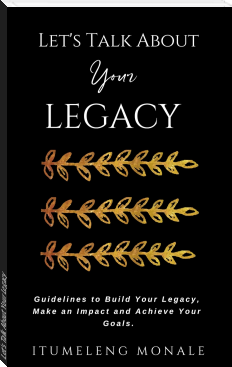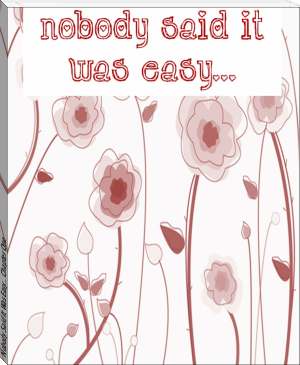How integrity helps in reaching the ultimate life goals by Sai Bhaskar Reddy Nakka (red queen ebook txt) 📕

Read free book «How integrity helps in reaching the ultimate life goals by Sai Bhaskar Reddy Nakka (red queen ebook txt) 📕» - read online or download for free at americanlibrarybooks.com
- Author: Sai Bhaskar Reddy Nakka
Read book online «How integrity helps in reaching the ultimate life goals by Sai Bhaskar Reddy Nakka (red queen ebook txt) 📕». Author - Sai Bhaskar Reddy Nakka
How integrity helps in reaching the ultimate life goals
by Dr. N. Sai Bhaskar Reddy
1st eBook Edition, released 2018
This is an ‘Open Knowledge’ book as declared by the author. [email protected] | http://saibhaskar.com
For ‘The Earth’
Introduction
A goal is an idea of the future or desired result that a person or a group of people envisions, plans and commits to achieve. So, goal is always ahead of time and not in the present. Integrity is the quality of being honest and having strong moral principles.
There is no guarantee that one one would live so many years. When, future is not predictable, so how one could plan a goal with certainty.
The goal is the ultimate means to achieve greater change. Peace, Love, Happiness, and Freedom are the fundamental building blocks which comprise goals. Spirit is the basic innate energy which should always be active in one’s life to achieve the goal. Spirit is a precursor to goal. Life without a goal is less meaningful.
Intention and initiative are necessary to realise one’s goal. Maximum performance is needed to achieve challenging goals. Goal is not something which is easily achievable. On the way of achieving goal, one would reach somewhere.
Working for oneself is not the goal. Like brushing teeth or combing hair or taking bath. These are mean things that one would do to exist on the earth.
Understanding the purpose of life at an early age makes life more valuable. Children being young may not comprehend ‘goal for the life,' they can have short-run goals. Goals can change over time and space for children, but after reaching a certain age, say between the age group 12 years and 18 years, they should understand and decide a goal and endeavour to achieve it.
The goal is like trying to reach the top of a peak. The time spent in reaching the peak is more than time spent at the peak. Achieving the goal implies all the processes are followed. An ant is never seen sleeping under a tree in spite of securing its food. An ant’s goal in life is to the well-being and prosperity of the community. A goal is ultimate and there is no loss in striving, one achieves it or will end up somewhere on the way.
The profession chosen need not be the goal, but the purpose and values around the result describe the Goal.
There are various quotes from scriptures, the process of achieving a goal and the relationship with the results or goal, are understood in different ways.
If achieving goal is one of the results, one should be conscious of the anticipated goal. As result is in the future and one could only focus on the present, which is a process or causing and achieving a series of smaller results. That is why in Bhagavadh Gita it is said, do your duty using the best of your abilities and don't think about the results. Every result should lead to achieving common goal that is the goal which benefits the society at large. Goal is not about the result, it is about the journey in ones life towards achieving the result. Therefore, goal is mostly in the subconscious mind and during contemplation it surfaces in the conscious mind.
There are various paths in achieving once goal. The path of hardships is less travelled and any person working in those areas and achieving results is visible.
As one's lifespan is anticipated but uncertain, having Goals based on time period are okay. Goals can be long-term, intermediate, or short-term. The primary difference is the time required to achieve them. A number of short-term goals could feed into achieving the medium-term and long-term goals. Long-term achievements rely on short-term achievements. Emotional control over the small moments of the single day makes a big difference in the long term.
Goals by source are like common goal, organisation goal, group goal and personal goal. The personal goals might be private, whereas the common goals are related to the society at large.
How to define one's goal?Achieving complex and difficult goals requires focus, long-term diligence and effort (see Goal pursuit). Success in any field requires forgoing excuses and justifications for poor performance or lack of adequate planning; in short, success requires emotional maturity. The measure of belief that people have in their ability to achieve a personal goal also affects that achievement.
There has been a lot of research conducted looking at the link between achieving desired goals, changes to self-efficacy and integrity and ultimately changes to subjective well-being. Goal efficacy refers to how likely an individual is to succeed in achieving their goal. Goal integrity refers to how consistent one's goals are with core aspects of the self. Research has shown that a focus on goal efficacy is associated with well-being factor happiness (subjective well-being) and goal integrity is associated with the well-being factor meaning (psychology). Multiple studies have shown the link between achieving long-term goals and changes in subjective well-being; most research shows that achieving goals that hold personal meaning to an individual increases feelings of subjective well-being.
Understanding one's goal
Every person has goals: there could be well defined goals; some goals are declared and explicit; some people are still planning and are on the path of declaring a larger goal based on the results achieved from smaller goals, etc.
Goal is like in an an Indian Rangoli - the grid of dots are same, but each person creates their designs by drawing the lines. This is based on each person's ability and interest. Life is like a maze appears very complex, but one could find the way to reach the goal.
Goal setting and planning ("goal work") promotes long-term vision, intermediate mission and short-term motivation. It focuses intention, desire, acquisition of knowledge, and helps to organise resources.
Goals are variable in time and space. If young people set their goals at an early age, they would have more time and capacity to change the world. But it is not possible to set goals early and the goals are often amended or new goals are set with time. The beauty of life is the goal that guides and drives every action of a person. Young children consider that their teachers are knowledgeable and wise, so they respect them. Many children say that they want to be a 'Teacher' when they grow up. If teachers are asked - What is their Goal in life? Many of them don’t have a straight answer. If teachers don’t have a life goal, how can they inspire the children towards a goal? Teachers bereft of a goal would never be able to teach a child what a ‘Goal’ is?
Learning is part of reaching goal
Being sensitive is a great boon for realising one’s goal and to lead in any facet of life. Awareness makes a person sensitive, sensitive person acquires knowledge and skills by all means also will do convergence and networking, sets the goals and achieves them. Learning is a continuous process and learning must meet the purpose. The purpose of learning should support one in achieving the personal and common goals. People eliminate a person for a job based on the qualification, skills, knowledge, etc. Instead of saying I don't know and loosing an opportunity, accept the challenge, learn and do the work.
Every work is part of common Goal
One cannot work for oneself. Every person's work is part of the whole. The whole is part of the goal. The common goals to be achieved is not someone’s job. Therefore, a leader inspires and in the space of “everyone a great leader”, strives for the achievement of common goals. For accomplishing a task a group of people coming together with strengths and diversity makes a team.
SDGs and Challenges Ahead
If one is confused to select a goal on their own, they could choose from the common goals as declared by UN. They could choose the work contributing to achieve some of the goals. The common challenges and sustainable development goals are explained below.
The United Nations Climate Change Conference, COP 21 or CMP 11 was held in Paris, France, from 30 November to 12 December 2015. A historic agreement to combat climate change and unleash actions and investment towards a low carbon, resilient and sustainable future was agreed by 195 nations. The universal agreement’s primary aim is to keep a global temperature rise this century well below 2 degrees Celsius and to drive efforts to limit the temperature increase even further to 1.5 degrees Celsius above pre-industrial levels.
At the United Nations Sustainable Development Summit on 25 September 2015, world leaders adopted the 2030 Agenda for Sustainable Development, which includes a set of 17 Sustainable Development Goals (SDGs) to end poverty, fight inequality and injustice, and tackle climate change by 2030. The 17 Sustainable Development Goals and 169 targets, demonstrate the scale and ambition of this new Global Agenda. They seek to build on the Millennium Development Goals and complete what these did not achieve. They try to realise the human rights of all and to achieve gender equality and the empowerment of all women and girls. They are integrated and indivisible and balance the three dimensions of sustainable development: the economic, social and environmental.
GOAL 1: No Poverty
GOAL 2: Zero Hunger
GOAL 3: Good Health and Well-being
GOAL 4: Quality Education
GOAL 5: Gender Equality
GOAL 6: Clean Water and Sanitation
GOAL 7: Affordable and Clean Energy
GOAL 8: Decent Work and Economic Growth
GOAL 9: Industry, Innovation and Infrastructure
GOAL 10: Reduced Inequality
GOAL 11: Sustainable Cities and Communities
GOAL 12: Responsible Consumption and Production
GOAL 13: Climate Action
GOAL 14: Life Below Water
GOAL 15: Life on Land
GOAL 16: Peace and Justice Strong Institutions
GOAL 17: Partnerships to achieve the Goal
The above two decisions are most important in the present context of global uncertainties. Frequent droughts affecting the underdeveloped and developing countries; depleting freshwater water sources; land degradation; loss of biodiversity; increased inequities and poverty; and increased forced migrants, asylum seekers and refugees as a result of some of the above reasons. The 2 degrees’ rise is a compromise by nations. At 2 degrees’ rise, all the SDGs would become more vulnerable to address. 2015 was the hottest year, records of the hottest years are broken now. Submergence of islands and coastal areas; frequent droughts and storms leading to floods are some of the impacts





Comments (0)